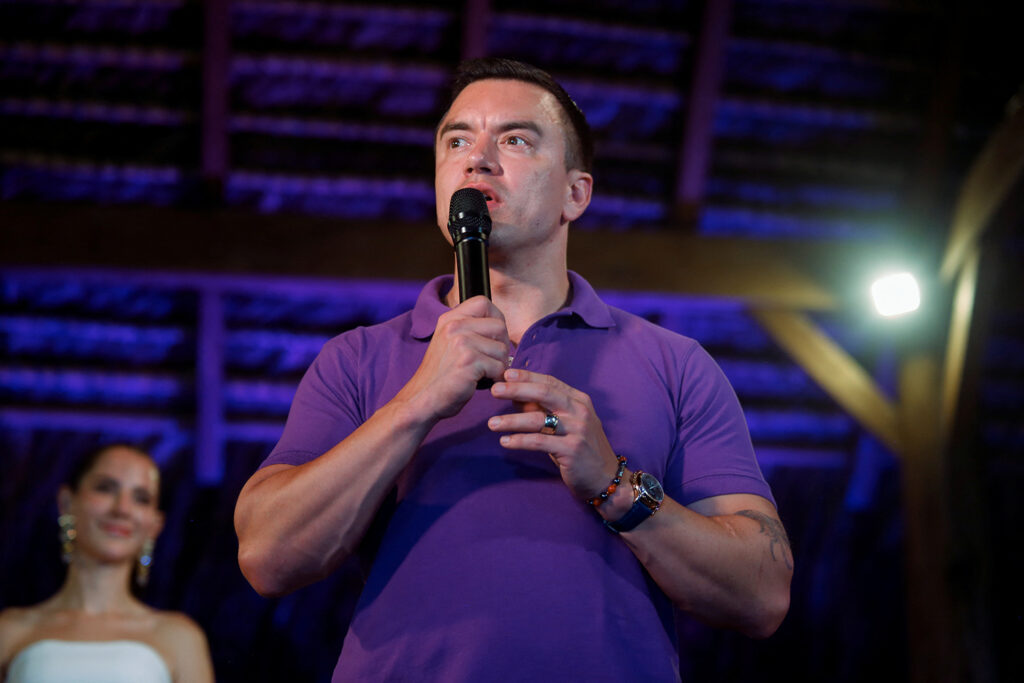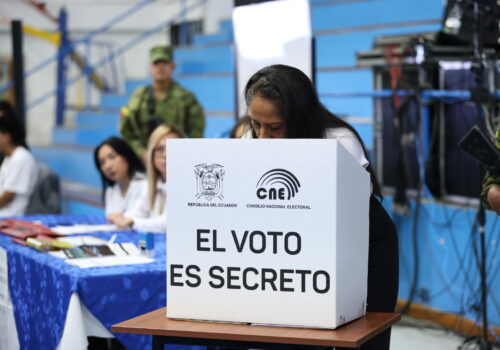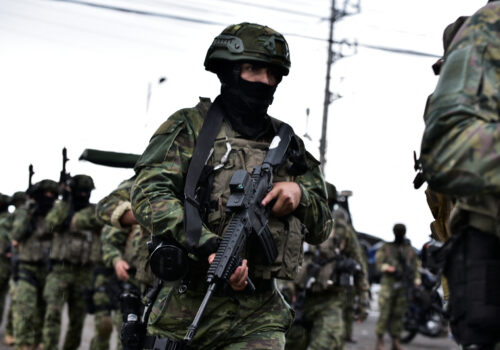In Sunday’s presidential election, the Ecuadorian people sent a clear signal of their hopes for economic stability, continuity, and closer alignment with Western allies in reelecting President Daniel Noboa. With 97 percent of the ballots counted and a voter turnout of 83 percent, Noboa and running mate Maria José Pinto secured more than 55 percent of the vote, an 11-percentage-point margin over challenger Luisa González, the heir to former President Rafael Correa’s populist legacy. González has refused to recognize the results and alleges that the results were fraudulent. However, her party has presented no concrete evidence to support this claim. Meanwhile, the National Electoral Council and international observers report no signs of widespread irregularities. Nevertheless, the claim fuels tensions in an already polarized electorate and could potentially result in social unrest.
In contrast with Noboa, González had signaled a drift from Western allies, including with statements that she would not recognize Edmundo González’s electoral win over dictator Nicolás Maduro in Venezuela and with her party’s flirtation with removing the dollar as Ecuador’s currency. Noboa’s win, despite his policy-light campaign, embodies steadiness and predictability, two aspects that are key for international cooperation.
Ecuador desperately needs international cooperation with partners such as the United States to curb the country’s crime wave and spur economic growth. Here’s what to expect for US-Ecuador relations now that Noboa will maintain his post in Quito.
Mano dura—but backed by American muscle?
Security will be the foundation of any strengthened partnership for the future of Ecuador. Noboa’s government has been firmly rooted in a “mano dura” (iron fist) policy, declaring an internal armed conflict against twenty-two criminal gangs in January 2024 and classifying them as terrorist organizations. Many of these groups work directly with transnational drug cartels including Mexico’s Sinaloa and Jalisco Nueva Generación, and even Albanian mafias; in addition. The intensifying operations of these groups has led to a spike in violence, including a staggering 1,300 homicides in just the first fifty days of 2025. Recurrent states of emergency and military deployments have become commonplace, especially in port cities such as Guayaquil, as the government fights to reclaim control of strategic trade routes. As the government has expanded its drug interdiction efforts, these criminal groups have diversified into other illicit markets including arms and human trafficking as well as illegal mining and logging to sustain their operations and increase their resilience.
Noboa is signaling a willingness to bring Ecuador’s security doctrine into alignment with Washington’s. He has done so by proposing the use of drones on borders and by requesting the assistance of US forces, reportedly preparing the port of Manta (which used to host a US air base, shut down by Correa in 2009) for their arrival. This commitment aligns well with US regional priorities. In the wake of rising transnational crime and drug trafficking across the hemisphere, the Trump administration—greatly concerned with border security and containing narcotrafficking—is keen to support governments willing to take action. Thus, Noboa’s openness to cooperation with the United States, particularly his willingness to integrate US intelligence and surveillance technology into domestic operations, could be met with interest.
Yet, the backdrop for Noboa’s second term will not lack of challenges. Ecuador remains stalled in a multidimensional crisis. The economy contracted in three out of four quarters in 2024, with the third posting a 1.5 percent decline in the gross domestic product. Ecuador had a $726 million fiscal deficit in the first quarter of 2025, marking the third largest deficit in a decade, and severe electricity shortages have caused blackouts of up to fourteen hours, further dampening economic prospects. Add to that the challenges of governing a polarized constituency—44.35 percent of whom voted for his opponent—and a country still traumatized by the assassination of presidential candidate Fernando Villavicencio during the 2023 election.
But opportunity also knocks. While Ecuador’s country risk, as measured by the investment bank JP Morgan, reached a fifteen-month high of 1,900 points in the days ahead of the elections, Ecuadorian sovereign bond prices soared following Noboa’s win, indicating strong investor confidence. This is telling: markets, outside observers, and potential allies see Noboa as a stabilizing force. Despite a fragmented National Assembly—where the opposition party, Citizen Revolution, holds sixty-seven seats compared to the sixty-six held by Noboa’s party—the significant margin in the election results suggests that many voters who supported other candidates in the first round backed Noboa in the second. This may pave the way for political alliances and cooperation, enabling the passage of key security and pro-investment legislation. For Washington, that is an open door for broadened strategic cooperation at the economic, political, and military levels.
Teasing out trade
Trade will also be on Noboa’s agenda for cooperation with the United States. The Trump administration has imposed a 10 percent tariff on Ecuadorian goods; however, it is important to note that, unlike other countries in the region, such as Peru and Colombia, Ecuador does not have a free trade agreement with the United States. This means the 10 percent tariff will be added to existing tariffs on other products, while goods that previously entered duty-free will now face a 10 percent tariff. Ecuador currently holds a negative trade balance of $644.5 million with the United States, but Ecuador’s economic vulnerability makes the United States a vital partner. The US market takes a significant portion of Ecuador’s nonpetroleum exports, mainly agricultural products such as shrimp, cacao, bananas, and flowers. If tariffs increase on countries that compete in providing these products to the United States—such as Vietnam and Cambodia, which Trump planned to hit with much higher tariff rates before a recent ninety-day pause—Ecuadorian exporters could capitalize on their comparative advantage. Yet, Ecuador is still at a disadvantage on other products that face higher levies such as roses, broccoli, and tuna. Therefore, Ecuador will likely bring up trade as an essential component of cooperation—provided Washington and Quito can establish predictable, rules-based trade arrangements.
On this note, Noboa’s apparent alignment and closeness with the Trump administration is significant. At a time when US migration policy is tightening and the hemisphere is shifting toward more pragmatic leadership on this front, Noboa’s actions signal that the bilateral relationship will be built on strategic alignment rather than ideological affinity. While Noboa’s visit to Mar-a-Lago on March 29 (deemed “friendly”) was faulted in some circles, it earned Noboa political capital at home. The Trump meeting also put González at a disadvantage, given her coalition’s association with anti-US rhetoric, including Correa’s statements after the United States imposed visa bans on him, his vice president, and their immediate families for corruption. Noboa built a victorious coalition in large part with older voters, some of whom expressed fear about the unpredictability that accompanies populist choices.
What change will take
The list of tasks ahead for Noboa is significant: His administration will need to balance a $36 billion budget amid rising crime and violence, declining petroleum revenues, and rising debt payments. The promise of better security, economic reactivation, and infrastructure modernization cannot be fulfilled without outside support and financing from multilateral lenders and foreign investment, including the United States.
Furthermore, there is the risk that any long-term alignment with Washington in pursuit of improving security and the economy will not be able to withstand Ecuador’s volatile domestic political landscape. The composition of the National Assembly, depending on how alliances and seats shake out before inauguration day, will be key to determining the difficulties or opportunities Noboa will face. At the same time, he must demonstrate his ability to navigate an increasingly polarized environment. To succeed, he will need to strike a careful balance between domestic legitimacy and external engagement, backing up his rhetoric with consistent action.
Noboa’s presidency may not have started with a master plan, but his second term will begin with a unique set of geopolitical alignments. The question now is whether he can turn them into tangible gains for Ecuador. For the United States, this is a rare chance to engage with a willing, democratically elected government in a region beset by instability. For Ecuador, it is a chance not only to restore domestic stability but also to continue combating the security crisis with the United States as a partner.
In a region where friendships blow with the political winds, Ecuador under Noboa can chart a course of pragmatic collaboration and strategic partnership—if both sides are willing to make it work.
Isabel Chiriboga is an assistant director at the Atlantic Council’s Adrienne Arsht Latin America Center.
Further reading
Fri, Apr 11, 2025
Cradle of violence: How criminal networks are winning Ecuador’s youth and threatening Latin America’s future
New Atlanticist By
As Ecuadorians vote for their next president on April 13, time is running out for a holistic approach to security that balances suppression with structural transformation.
Tue, Feb 4, 2025
What Ecuador’s election will mean for the region’s fight against organized crime
New Atlanticist By Isabel Chiriboga
The winner of Ecuador’s presidential election will need to adopt a new approach to confronting the country’s security and economic challenges.
Wed, Jan 10, 2024
Ecuador has declared ‘internal armed conflict’ against criminal gangs. What’s next?
New Atlanticist By Isabel Chiriboga
Ecuadorian President Daniel Noboa has mobilized the military to fight criminal groups in his country, following two notorious criminal leaders’ escape from prison.
Image: Ecuador's President and candidate for reelection Daniel Noboa addresses the media as the electoral council says he has won the presidential election, in Santa Elena, Ecuador, on April 13, 2025. Photo via REUTERS/David Diaz Arcos.



